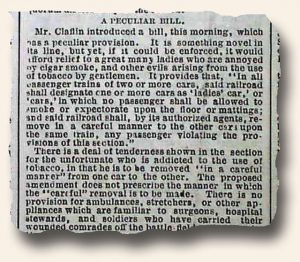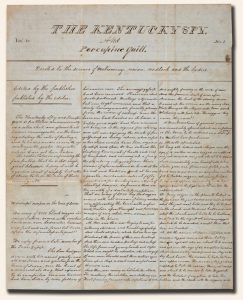Perhaps one of Gilligan’s ancestors… What does it mean?
November 28, 2016 by TimHughes · Leave a Comment
 An issue of “The Gunnison Advertiser” from Colorado, 1882, notes that it is: “Published Semi-Occasionally…”. Just what does this mean? If “occasionally” means it is not on any set schedule–printed at the whim of the publisher–how much more defining is “semi-occasionally”?
An issue of “The Gunnison Advertiser” from Colorado, 1882, notes that it is: “Published Semi-Occasionally…”. Just what does this mean? If “occasionally” means it is not on any set schedule–printed at the whim of the publisher–how much more defining is “semi-occasionally”?
Just curious. Any ideas?
They put it in print… Execution bar set a little too low?
October 24, 2016 by TimHughes · Leave a Comment
 Interesting wording for historic headlines always get my attention. We recently discovered an 1865 issue of the “New York Day-Book” which has at the top of the front page: “Execution Of The Alleged Conspirators…”. Makes one think: shouldn’t they be determined to no longer be “alleged” before they are executed?
Interesting wording for historic headlines always get my attention. We recently discovered an 1865 issue of the “New York Day-Book” which has at the top of the front page: “Execution Of The Alleged Conspirators…”. Makes one think: shouldn’t they be determined to no longer be “alleged” before they are executed?
Where did it end up? Boston
October 20, 2016 by GuyHeilenman · Leave a Comment
 As both collectors and sellers of historic newspapers, we (Rare Newspapers) often wonder what happens with many of the issues which pass through our hands. We know some have been given to Presidents, well-known authors, and various public figures throughout the world. Equally rewarding are those which end up in the hands of those whom either love history or have a personal connection with the issue’s content. Many are found in museums for all to see, yet others a likely stored away in boxes for protection and many never again see the light of day. Regardless of their final resting place, we derive a certain degree of satisfaction in knowing we play a part in preserving history in written form. With these thoughts as a backdrop…
As both collectors and sellers of historic newspapers, we (Rare Newspapers) often wonder what happens with many of the issues which pass through our hands. We know some have been given to Presidents, well-known authors, and various public figures throughout the world. Equally rewarding are those which end up in the hands of those whom either love history or have a personal connection with the issue’s content. Many are found in museums for all to see, yet others a likely stored away in boxes for protection and many never again see the light of day. Regardless of their final resting place, we derive a certain degree of satisfaction in knowing we play a part in preserving history in written form. With these thoughts as a backdrop…
We recently became aware of how one issue has been put to use (see image). Feel free to explore:
BOSTON SEMI-WEEKLY ADVERTISER, Sept. 20, 1856
Medical marijuana! How about a prescription for beer?
October 10, 2016 by TimHughes · Leave a Comment
The controversy over medical marijuana is nothing new in attempts to circumvent the law for outlawed drugs. Shortly after Prohibition became the law of the land in 1919, the “New York Times” reported in its Oct. 26, 1921 issue: “Beer As Medicine In Nine States Only” “New Treasury Regulations Inoperative in States Having Local Prohibition” “Thinks People of Nation Will Object When They See Drug Stores Handling Booze”. The article begins: “The brewers have several hurdles yet to make before medical beer is a reality…” with much more.
Early no-smoking cars on trains…
September 26, 2016 by TimHughes · Leave a Comment
 While the most significant feature of the “St. Louis Daily Globe” of February 2, 1875 is a report regarding Frank and Jesse James, the front page has a curious report headed: “A Peculiar Bill” concerning the need to create nonsmoking cars which would: “…afford relief to a great many ladies who are annoyed by cigar smoke, and other evils arising from the use of tobacco by gentlemen…” (see image).
While the most significant feature of the “St. Louis Daily Globe” of February 2, 1875 is a report regarding Frank and Jesse James, the front page has a curious report headed: “A Peculiar Bill” concerning the need to create nonsmoking cars which would: “…afford relief to a great many ladies who are annoyed by cigar smoke, and other evils arising from the use of tobacco by gentlemen…” (see image).
For whom the Baby Ruth candy bar was named…
September 12, 2016 by TimHughes · 2 Comments
The history of the origin of the name of the “Baby Ruth” candy bar by the Curtis Candy Company is interesting, brought to light recently with our finding the “Frank Leslie’s Illustrated” issue of Jan. 5, 1893. The full front page is an illustration captioned: “Baby Ruth and Her Mother” being the child of President Grover Cleveland. This is the person for whom the “Baby Ruth” candy bar was named, not Babe Ruth the famous baseball star as was popularly though. And the story behind the name is interesting.
 In Chicago in 1921 Otto Schnering had a turnaround plan for his Curtis Candy Company. He reformulated his “Kandy Kake” brand confection—a conglomeration of milk chocolate, peanuts and a pudding center “richer than marshmallow, fluffier than nougat, better than either of them”—into a chocolate-covered candy bar with peanuts, caramel and nougat. Along with the new recipe came a new name—Baby Ruth. At first glance, it seemed clear that Schnering had taken advantage of the home run king’s well-known name and tweaked it by one letter in order to avoid paying the “Sultan of Swat” any royalties.
In Chicago in 1921 Otto Schnering had a turnaround plan for his Curtis Candy Company. He reformulated his “Kandy Kake” brand confection—a conglomeration of milk chocolate, peanuts and a pudding center “richer than marshmallow, fluffier than nougat, better than either of them”—into a chocolate-covered candy bar with peanuts, caramel and nougat. Along with the new recipe came a new name—Baby Ruth. At first glance, it seemed clear that Schnering had taken advantage of the home run king’s well-known name and tweaked it by one letter in order to avoid paying the “Sultan of Swat” any royalties.
Perhaps because of its perceived connection to the Yankee slugger, Baby Ruth was a big success. By 1926, sales of the candy bar totaled $1 million a month, and the company’s candy-making facilities were the largest of their kind in the world.
In 1926, Ruth decided to enter the candy business himself and licensed his name to the George H. Ruth Candy Company, which sought to register “Ruth’s Home Run Candy” with the U.S. Patent and Trademark Office. Wrappers showed a head shot of a smiling Ruth in his uniform along with the note “Babe Ruth’s Own Candy.” The Curtiss Candy Company sued for copyright infringement and claimed that the candy bar had not been named after the baseball star, but Ruth Cleveland, eldest daughter of President Grover Cleveland. The explanation seemed odd given that the girl nicknamed “Baby Ruth” by the press had been born in 1891, three decades before the introduction of the candy bar. By 1921, not only was she not a baby, she wasn’t even alive, having died of diphtheria in 1904. Newspapers and the American public paid close attention to “Baby Ruth” after her father returned to the White House in 1893 for his second presidential term, but the Clevelands fiercely protected their daughter’s privacy and refused repeated requests by American newspapers to take her photograph. Few Americans ever knew what “Baby Ruth” looked like. By 1921, Babe Ruth was a household name while “Baby Ruth,” who died 17 years beforehand, was an historical footnote. (credit www.history.com)
Given the above, it is curious that this image of Baby Ruth Cleveland appeared on the front page of this very popular illustrated newspaper. Perhaps it is the only image of her in a newspaper.
Anyone know anything about this newspaper?
August 22, 2016 by TimHughes · Leave a Comment
If any of our collectors are looking for an interesting puzzle to solve, here is one. We’ve come across a single sheet newspaper from Dublin, Ireland, “THE FLYING NEWS-LETTER“, with “Monday October 11” in the dateline. This would seems to be an exceedingly rare title as an internet search resulted in nothing with this title from Dublin.
 There is no issue number noted in the masthead as would be typical. There is also no year printed in the dateline, but a search notes that the only Mondays which fell on October 11 from the mid-18th century (my estimate based on paper, format, layout) in which the printer, Edward Exshaw, was working as a printer were 1736 and 1742 as he died in 1748. The years 1725, 1731 also had a Monday, October 11, but a website notes he was “active in Dublin from 1733-1748”. And 1756 and 1762 also had a Monday, October 11, but being after his death his name would not had been in the imprint at the bottom of the back page.
There is no issue number noted in the masthead as would be typical. There is also no year printed in the dateline, but a search notes that the only Mondays which fell on October 11 from the mid-18th century (my estimate based on paper, format, layout) in which the printer, Edward Exshaw, was working as a printer were 1736 and 1742 as he died in 1748. The years 1725, 1731 also had a Monday, October 11, but a website notes he was “active in Dublin from 1733-1748”. And 1756 and 1762 also had a Monday, October 11, but being after his death his name would not had been in the imprint at the bottom of the back page.
I would be curious to know which of these two years it was printed (no year is noted in any of the articles), and a bit more about how long the newspaper published. Is this issue unique?
Thanks for any help!
A gem from the American Antiquarian Society… The Kentucky Spy…
August 8, 2016 by TimHughes · Leave a Comment
In celebration of its 20oth anniversary the American Antiquarian Society published a beautiful exhibition catalog titled “In Pursuit Of A Vision – Two Centuries of Collecting at the American Antiquarian Society”. Featured are a fascinating array of books, documents, maps & other paper ephemera, as well as several very rare & unusual newspapers we felt worthy of sharing with our collectors (with permission from the A.A.S.).
 181. “The Kentucky Spy and Porcupine Quill“, Frankfort, Kentucky, January 25, 1849
181. “The Kentucky Spy and Porcupine Quill“, Frankfort, Kentucky, January 25, 1849
In recent years AAS has actively collected issues of pre-1877 American manuscript periodicals. These handwritten examples mimic printed periodicals in format and content, containing stories, news, and advertisements. Sometimes they were produced by individuals, serving as the manuscript equivalent of amateur newspapers, and sometimes they were issued by small groups. Others were produced as an activity of a school or lyceum.
AAS has held manuscript periodicals since the nineteenth century; but because these were long shelved alongside printed periodicals, they were easily overlooked. In the 1990s AAS staff began to pull them together into a separate collection, in the process discovering not only how many titles were already at AAS, but also the frequency with which they were produced. As it became apparent that the more specimens AAS had, the more they collectively revealed about early American scribal culture, AAS began to seek them actively. The collection now numbers more than sixty titles.
One of the more unusual is “The Kentucky Spy and Porcupine Quill.” The masthead claims that it is “Devoted to the science of matrimony, union, wedlock and the ladies.” However, the chief story, entitled “Wonderful rumpus in the town of Irvine,” is a fictional account, humorous in tone, of a revolt by 5,000 heavily armed slaves which in the story turns out to be a hoax. The editor and contributor(s) are unnamed.
An August, 2016 stroll back thru time – 50, 100, 150, 200, & 250 years ago…
August 4, 2016 by GuyHeilenman · Leave a Comment
 What news was reported in the month of August – 50, 100, 150, 200, and 250 years ago (1966, 1916, 1866, 1816, 1766)? Such a walk back through time via the eyes of those who read the daily and weekly newspapers of the period can be quite revealing. This is why we often say, “History is never more fascinating than when it’s read from the day it was first reported.” The following links will take you back in time to show the available newspapers from the Rare & Early newspapers website. There’s no need to buy a thing. Simply enjoy the stroll.
What news was reported in the month of August – 50, 100, 150, 200, and 250 years ago (1966, 1916, 1866, 1816, 1766)? Such a walk back through time via the eyes of those who read the daily and weekly newspapers of the period can be quite revealing. This is why we often say, “History is never more fascinating than when it’s read from the day it was first reported.” The following links will take you back in time to show the available newspapers from the Rare & Early newspapers website. There’s no need to buy a thing. Simply enjoy the stroll.
The Holocaust… Truth be told…
July 28, 2016 by GuyHeilenman · Leave a Comment
TRUE: The Nazis inflicted unspeakable atrocities on millions upon millions of people.
TRUE: Most of the world was shocked as details of the horrors were revealed after the war.
FALSE: The Nazis’ agenda was a deep-kept secret.
FALSE: Remaining silent and/or turning a blind eye to evil makes it go away.
How could the Hitler-orchestrated holocaust have happened without the world’s knowledge? Since the end of WWII many have distanced themselves from complicity due to inaction. Nations and individuals both often declare they had no idea such atrocities were taking place – stating evidence of Adolph Hitler’s extreme intentions were kept under wraps. However, truth be told, the entire world was not unaware of Hitler’s desire and willingness to do whatever it took to create a so-called “pure” race. Articles regarding his agenda reached American newspapers as far back as the early 1930’s.  This point was recently brought to our attention as we were perusing the New York Times for December 8, 1931. There we found a front page report with the two-column heading: “Nazis’ Would Assure Nordic Dominance, Sterilize Some Races, Ban Miscegenation”, with considerable details to follow. Perhaps the world didn’t realize the extent of the horrors that were occurring, but this article, as well as a score of others, certainly should not have gone unnoticed.
This point was recently brought to our attention as we were perusing the New York Times for December 8, 1931. There we found a front page report with the two-column heading: “Nazis’ Would Assure Nordic Dominance, Sterilize Some Races, Ban Miscegenation”, with considerable details to follow. Perhaps the world didn’t realize the extent of the horrors that were occurring, but this article, as well as a score of others, certainly should not have gone unnoticed.
This certainly begs the question: “Are similar atrocities happening today? Are other mass-forms of oppression, brutality, or worse taking place within our reach? We can look away, but a verse from the Bible reminds us: “Remember, it is sin to know what you ought to do and then not do it (James 4:17).” We may put our head in the sand, but we are not without excuse. Hopefully the truth regarding our past mistakes will spur us to proper action today.




